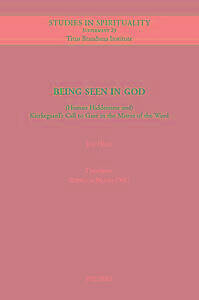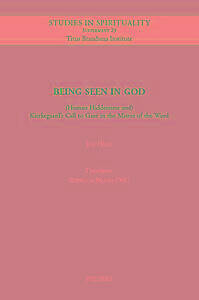
Door een staking bij bpost kan je online bestelling op dit moment iets langer onderweg zijn dan voorzien. Dringend iets nodig? Onze winkels ontvangen jou met open armen!
- Afhalen na 1 uur in een winkel met voorraad
- Gratis thuislevering in België vanaf € 30
- Ruim aanbod met 7 miljoen producten
Door een staking bij bpost kan je online bestelling op dit moment iets langer onderweg zijn dan voorzien. Dringend iets nodig? Onze winkels ontvangen jou met open armen!
- Afhalen na 1 uur in een winkel met voorraad
- Gratis thuislevering in België vanaf € 30
- Ruim aanbod met 7 miljoen producten
Zoeken
Being Seen in God
(Human Hiddenness And) Kierkegaard's Call to Gaze in the Mirror of the Word
J Huls
€ 84,00
+ 168 punten
Omschrijving
The Danish author Soren Aabye Kierkegaard (1813-1855) is one the best-known theologians in the intellectual history of modernity since the nineteenth century. His influence is comprehensive: it is to be detected, amongst others, in theological, philosophical, literary, psychological and aesthetic discourses across the globe in many contexts. As such this publication will provide welcome input in further reflection on Kierkegaard's role in the interpretation of Scripture in modernity. Huls's book is a refreshing addition to Kierkegaardian studies, which will pave the way for further research on one of the great thinkers of our time. It is also a useful contribution to the debate in contemporary hermeneutics about the legacy of the Enlightenment and the nature of biblical interpretation as a hermeneutical enterprise. (Pieter de Villiers) Scripture aims to bring us back to our being-seen-in-God. By being alone with it, we realize that in it we are looking in the mirror of Him who loves us from our origin. In reading Scripture, we can, consequently, not be allowed to flee in all sorts of human fabrications about Scripture, as if only the knowledge of theologians could expose the true meaning of Scripture. Every person, whether well-schooled or not, whether he has much or little knowledge, knows Scripture, because before all else Scripture lives in us. Scripture merely reminds us of the Word that is spoken in us immediately and that constitutes our subjectivity. As long as the Word has not truly made us fall silent and we ourselves still think we have a say, the Word does not yet have us in its grasp. Only when we truly fall silent, in the realization that our human logic shrinks into insignificance compared to the wisdom of Him who loves us from our origin, can this Word become directive in our existence. Because there is trly only one eternal object of wonder - that is God - and only one possible hindrance to wonder - and that is a person when he himself wants to be something.
Specificaties
Betrokkenen
- Auteur(s):
- Uitgeverij:
Inhoud
- Aantal bladzijden:
- 478
- Taal:
- Engels
- Reeks:
- Reeksnummer:
- nr. 29
Eigenschappen
- Productcode (EAN):
- 9789042935358
- Verschijningsdatum:
- 31/12/2017
- Uitvoering:
- Paperback
- Formaat:
- Trade paperback (VS)
- Afmetingen:
- 160 mm x 240 mm
- Gewicht:
- 458 g

Alleen bij Standaard Boekhandel
+ 168 punten op je klantenkaart van Standaard Boekhandel
Beoordelingen
We publiceren alleen reviews die voldoen aan de voorwaarden voor reviews. Bekijk onze voorwaarden voor reviews.











